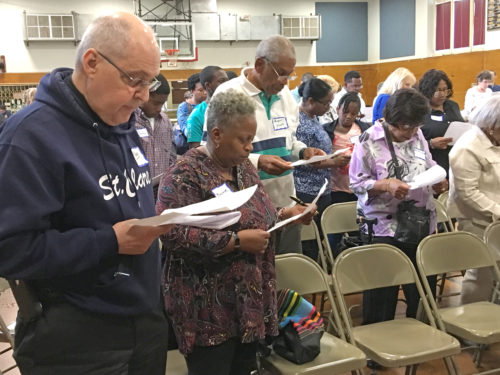
Talking openly about the sin of racism in the Catholic Church is difficult and uncomfortable, said Father Alonzo Cox.
As secretary of the diocesan Commission on Racism and Social Justice, he said it is also something that must be done.
“This is uncomfortable. The sin of racism is uncomfortable. We need to move out of our comfort zones, my sisters and brothers,” he urged those gathered at St. Clare’s Church in Rosedale June 23.
A desire to confront this sin and seek solutions drew more than 100 people to the Queens parish last weekend for an opportunity to voice their feelings and experiences, and share ideas for moving forward in the light of Christ.
It was the second of two listening sessions on racism, organized by the diocesan Commission on Racism and Social Justice. The first was held June 16 at St. Francis of Assisi-St. Blaise parish in Crown Heights.
“The purpose of these listening sessions is to hear from you,” Father Cox told attendees. “We want to hear how racism has affected you, how racism has affected the life of the Church, particularly here in the Diocese of Brooklyn.”
No longer a black and white issue, he said, racism affects people of every color, culture and ethnicity. In participating in the day, he asked everyone to have an open heart and mind – never forgetting the offenses, pains and struggles of the past – but focused on what the Church can do from this point on to eliminate racism and create unity.
Seeking Honesty and Healing
“Today, we want to look at our own church and diocese, to learn from your experiences, so that we may go forward as the Body of Christ, as a community of healing, forgiveness and witness,” said Auxiliary Bishop Neil E. Tiedemann, C.P., who chairs the diocesan commission.
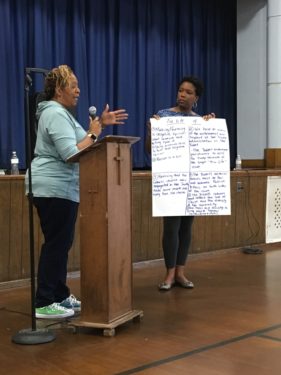
Both sessions opened with a prayer service, a statement from the U.S. bishops’ conference and an examination of conscience with an image of Servant of God Msgr. Bernard Quinn as a focal point. In small groups, the faithful then discussed four questions. Responses were recorded and presented to the entire assembly, and passed onto the commission.
Participants included priests and deacons, religious sisters from at least two communities, middle-aged and older adults as well as members of St. Clare’s youth group. The crowd was mainly black with nearly a dozen white and a couple of Asian attendees, and at least one non-Catholic from an African Methodist Episcopal Church.
Also present was Danielle Brown, associate director for the U.S. bishops’ Ad Hoc Committee Against Racism, which was formed last August to address racism in society and the Church, and the “urgent need” to find solutions after the racially motivated violence in Charlottesville, Va.
Within days of the U.S. bishops’ announcement, Bishop Nicholas DiMarzio formed a similar commission in the Brooklyn Diocese – one of the most diverse dioceses in the country, if not the world. Members include Bishop Tiedemann and Father Cox, a deacon and four laypeople.
“We’re one of the first dioceses having these listening sessions so we’re above the curve, we’re moving forward. We’ll be able to present this to Bishop DiMarzio, and then he will present this to the bishops’ conference,” Father Cox said.
Among small groups last Saturday, the dialogue was frank, and disturbing at times, as people shared personal incidents and views.
Groups had about 45 minutes to discuss what racism is; how they have experienced, witnessed or seen racism in their parish, school or in the diocese; how racism has affected their faith; and what can be done to combat racism in the diocese.
When the assembly reconvened, each group took turns presenting its responses. People shared accounts of fellow parishioners refusing to exchange the sign of peace, and pastors sending people to other parishes based on skin color. They also related racism against priests, mainly foreign-born, due to their accents or skin color.
A black mother shared her fight to get her daughter into advanced academic classes at a Catholic high school. Then at graduation, her daughter was overlooked for a special honor. White parents said they felt the young woman deserved the honor and didn’t know why she was overlooked.
Older area residents recalled pastors who would not admit black families to their parishes and schools years ago, and crosses being burned in the yards of black families in the 1970s and early ’80s. Glenda Spencer said her family’s house was burned and bombed when they moved from London to Rosedale in 1974.
Some said they knew of friends or family who had left a particular parish, and at least one woman said a relative went to another Christian denomination, but most affirmed that they wouldn’t abandon their faith or their Church because of racism.
Regarding issues on the diocesan level, several groups mentioned The Tablet. One representative stated that the faces seen in print are mostly white and that the newspaper presumes most children attend Catholic school. This group called for more diversity in the pages, and more publicity for parish faith formation programs and the public school children attending them.
That same group noted that diocesan liturgies are “bland,” and the music and expressions of faith do not speak to the diversity of ethnic groups in the diocese.
“The public image of our diocese that we see in print and in liturgy does not express who our diocese is,” the group’s representative said. “We are not the exception. We are part of the diocese. And many ethnic groups are made to feel that they are the exception, not the real diocese.”
Another group put forth its stance that they have “seen an increase of endorsements and support of the Trump administration in The Tablet. The Tablet encouraged parishioners to vote for Trump because of a single pro-life issue.”
Other diocesan-level concerns were raised in regard to the lack of black priests and parishioners in this year’s Annual Catholic Appeal video, and the prevalence of white principals and teachers in the diocesan Catholic education system.
Seeing a “bigger and greater presence [of diverse faces] on the administrative level of the Catholic Church,” was the hope of another group.
Suggestions for reducing racism included providing sensitivity training for priests; organizing visits between diverse parishes; a regular column by a member of the commission on racism in the diocesan newspaper; more homilies on racism and more education about black saints.
And as one woman said plainly, “If someone is doing something wrong, address it – amicably.”
A young man named Andrew from St. Clare’s parish, added that his group would like to see “more inclusive, multi-ethnic events as a diocese – not only African-Americans, not only Spanish people, not only Asians – everyone.”
Bishop Tiedemann expressed his gratitude for the sharing and listening that took place, and told attendees that this was only a first step. The commission will digest what has been said, present the findings to the bishop and try to find ways to deal with the concerns raised.
“We will try to respond to the needs of our people,” he said, explaining that faith is a struggle, and change is a process with challenges along the way.
Bishop Tiedemann said he found some suggestions very interesting, specifically those that could be arranged on the parish or deanery level, like visits to other churches, international events and feast-day celebrations for black saints.
The session gave St. Clare’s parishioner Myrtelle Ernest some hope for the future of the Church.
“If they do take all of our situations to heart, then maybe, just maybe, in my life I could see the day when the words that Martin Luther King spoke are really put into focus,” she said.
“If the Church speaks out, people will listen. They’re just waiting for the Church.”

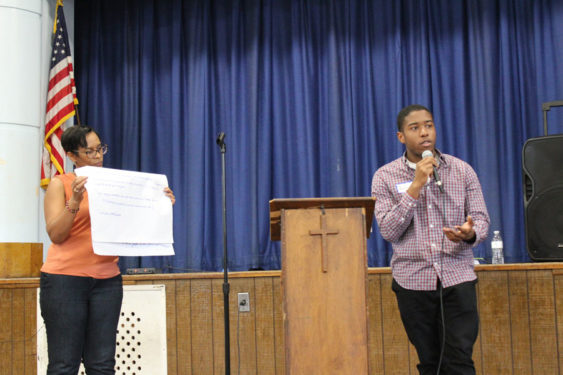
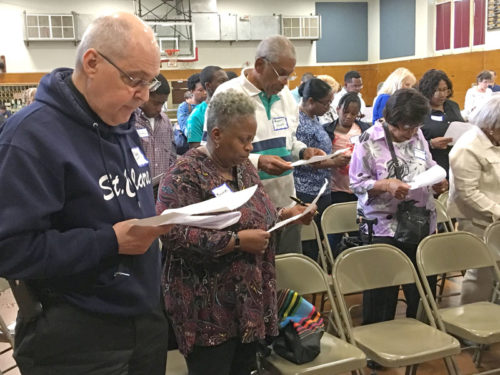
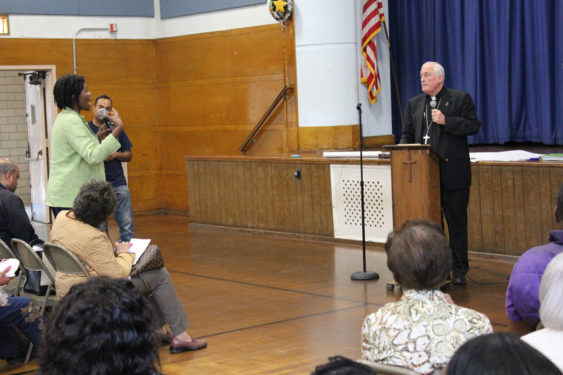
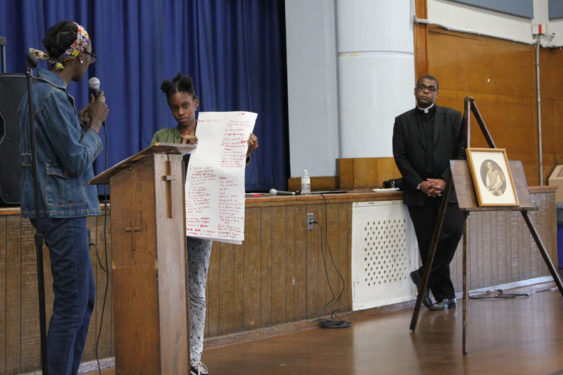
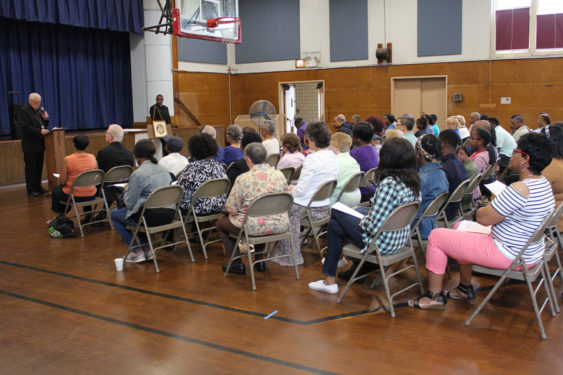
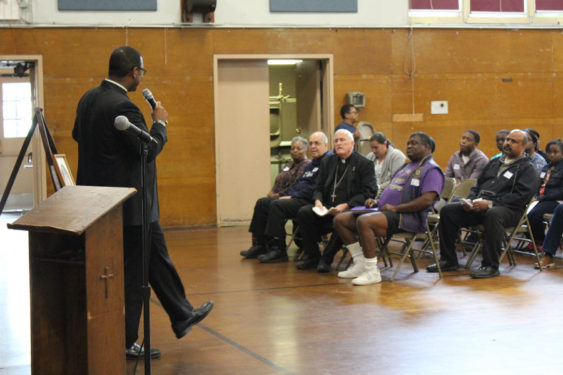
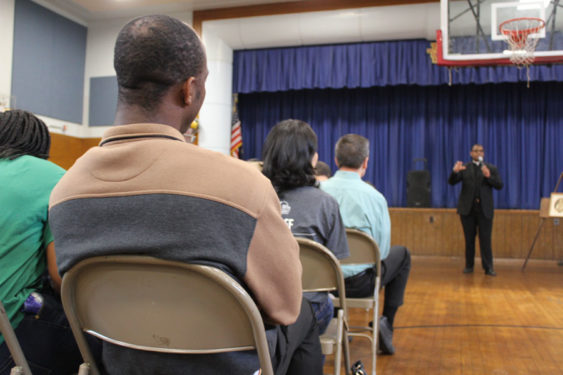
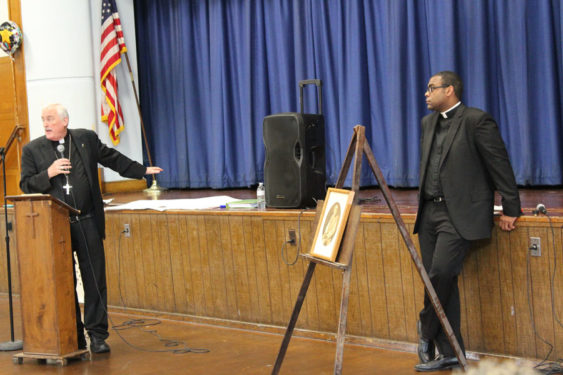
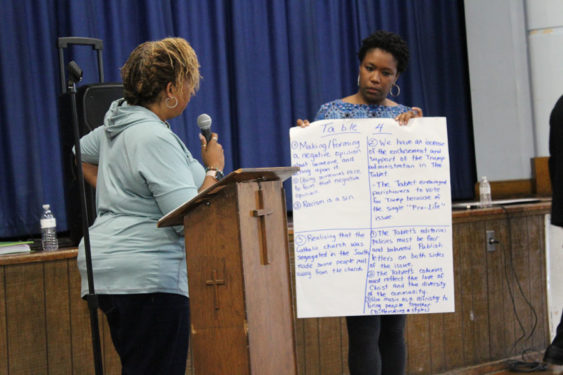
I’m writing to congratulate the author of this article, Marie Elena Grossi, on her superb reporting on the article “Inclusion Is A ConcernAt Listening Session On Race.”
I met Ms. Giossi prior to the session. She asked if I was a member of the church. My reply was “I am not a member of St. Clare and I am not a catholic.” We continued to dialogue on the subject of racism and I told her that I am a protestant, a member of of the African Methodist Episcopal Church. I told her that ironically the African Methodist Episcopal Church was started because of racism towards Blacks in the Methodist. Seeing that Ms. Giossi showed an interest on the subject I directed her to research Bishop Richard Allen, our founder, and the AME Church on the internet to learn our history.
As a teenager I was a member the Brooklyn Ecumenical Council. In our group we had representation from all races and religious persuasions. We dealt with all facets of racism. That was over sixty years ago. Attending this seminar it seemed as though racism took a few steps backwards instead of going forward. Attending this seminar was a real eye opener. I do not have a working knowledge of the Catholic Church. The session allowed the parishioners to express publicly their negative experiences and frustrations. I thank God that their faith allowed them to persevere and hold on to their religion.
It is appalling to know that racism is still so prevalent.in the Catholic Church. To know that disciples of Jesus Christ are enacting in adverse teachings of Jesus Christ is upsetting. The Preamble to the Declaration of Independence indicated “We hold these truths to be self evident, that all men are created equal, that they are endowed by their Creator with certain unalienable Rights, that among these are Life, Liberty and the Pursuit of Happiness. Despite this
Declaration, there are many leaders that do not abide by the teaching of a monotheist religion. thus the theology of one God for ALL People is not exercised. Unless diversity training is given and employed to the leaders of the church, change will not pervade in the Catholic Church. Although I am not a member of the Catholic Church, I pray for change.